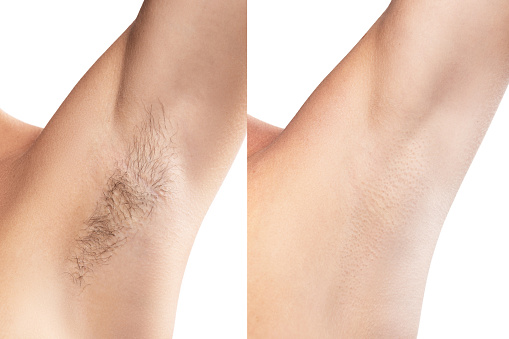Laser hair removal can result in long-term hair reduction, but it is not always permanent. The effectiveness of laser hair removal depends on several factors, including the color and thickness of the hair being treated, the color of the skin, and the type of laser used.
During laser hair removal, a concentrated beam of light targets the melanin (pigment) in the hair follicles, which damages them and inhibits their ability to grow hair. Because the laser targets the melanin in the hair, it is more effective on dark hair and less effective on light hair.
While many people experience a significant reduction in hair growth after laser hair removal, it is possible for some hair to regrow over time. Multiple treatment sessions may be needed to achieve the desired results, and maintenance treatments may be necessary to maintain the hair reduction.
Overall, laser hair removal can be an effective method for reducing unwanted hair growth, but it is important to manage expectations and understand that it may not be a permanent solution for everyone.

How long does laser hair removal last forever?
Laser hair removal can result in long-term hair reduction, but it is not always permanent. The duration of the results of laser hair removal can vary from person to person and depends on several factors, including the color and thickness of the hair being treated, the color of the skin, and the type of laser used.
Generally, after completing a full series of laser hair removal treatments, most people experience a significant reduction in hair growth that lasts for several months to a few years. However, some hair may eventually regrow, and maintenance treatments may be necessary to maintain the results.
It is important to note that laser hair removal does not work for everyone, and some people may not see significant results even after multiple treatment sessions. Additionally, the results of laser hair removal can be affected by hormonal changes, such as pregnancy or menopause, and some medications can also interfere with the effectiveness of the treatment.
In summary, while laser hair removal can provide long-term hair reduction, the duration of the results can vary from person to person, and maintenance treatments may be necessary to maintain the results.
Does hair grow back if you stop laser?

Can you shave after laser hair removal?
Yes, you can shave after laser hair removal, but there are some important things to keep in mind to ensure the best results and minimize the risk of complications.
It is generally recommended to wait at least 24 to 48 hours after a laser hair removal treatment before shaving the treated area. This allows the skin to heal and reduces the risk of irritation or damage to the hair follicles.
When shaving after laser hair removal, it is important to use a clean, sharp razor and to avoid using any products that could irritate the skin, such as harsh soaps or exfoliants. It is also important to avoid any other hair removal methods, such as waxing or plucking, as these can disrupt the hair growth cycle and interfere with the effectiveness of the laser treatment.
Additionally, it is important to continue to protect the skin from sun exposure after laser hair removal, as sun damage can interfere with the results of the treatment.
Overall, shaving after laser hair removal is generally safe and can help to maintain the results of the treatment. However, it is important to follow the recommendations of your provider and to take good care of your skin to ensure the best possible results.
Why is my hair still there after laser?
There are several reasons why hair may still be present after laser hair removal treatments, even if you have completed a full series of treatments.
First, it is important to note that laser hair removal is not 100% effective for everyone. The effectiveness of the treatment depends on several factors, including the color and thickness of the hair being treated, the color of the skin, and the type of laser used. Additionally, hormonal changes or changes in medication use can affect the results of the treatment.
Another reason why hair may still be present after laser hair removal is that the treatment may not have been administered correctly or at the right settings. It is important to work with a qualified and experienced provider who can adjust the settings of the laser to your individual skin and hair type to ensure the best possible results.

Additionally, it is important to note that laser hair removal only targets hair in the active growth phase, and not all hair follicles are in the same phase at the same time. This means that multiple treatment sessions are usually necessary to target all of the hair follicles and achieve the desired results.
In summary, there are several reasons why hair may still be present after laser hair removal treatments, including the effectiveness of the treatment, the administration of the treatment, and the hair growth cycle. It is important to have realistic expectations about the results of laser hair removal and to work with a qualified provider to determine the best treatment plan for your individual needs.
